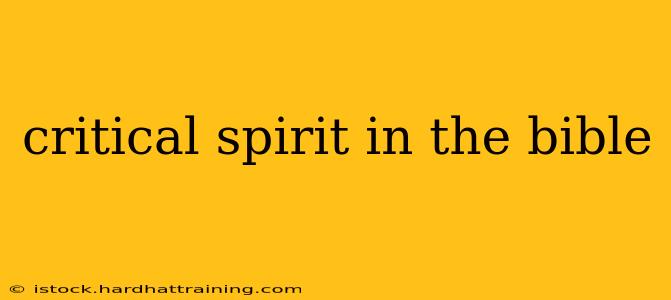The Bible, a collection of texts spanning centuries and diverse authors, isn't a monolithic endorsement of blind faith. While reverence and obedience are central themes, a careful reading reveals a complex interplay of unquestioning devotion and critical engagement with religious authority, societal norms, and even God himself. Understanding the nuanced presentation of "critical spirit" within the biblical narrative is key to appreciating its depth and relevance for modern readers.
Doubt and Discernment: A Necessary Tension
The Bible doesn't shy away from depicting doubt. Abraham's questioning of God's promise (Genesis 18:23-33), the Israelites' repeated murmuring and questioning of Moses' leadership (Exodus 16, 17), and even the disciples' struggles with faith (Matthew 14:31, John 20:24-29) all highlight the legitimacy of doubt as a part of the human experience, even within a deeply religious context. This isn't presented as a lack of faith, but rather as a catalyst for deeper understanding and a stronger relationship with the divine. Doubt, in this sense, becomes a tool for discernment – a critical examination of beliefs and actions to ensure authenticity and alignment with God's will.
Examples of Critical Inquiry within the Biblical Texts:
- The Prophets: Figures like Isaiah, Jeremiah, and Amos consistently challenged the religious and political institutions of their time, criticizing injustice, hypocrisy, and idolatry. Their critiques weren't merely expressions of anger, but acts of prophetic discernment, calling the people back to genuine faith and righteous living. This involved critical analysis of societal structures and religious practices.
- Jesus' Ministry: Jesus himself engaged in critical analysis of the Pharisees' legalistic interpretations of the law (Matthew 23), exposing hypocrisy and challenging their authority. He consistently questioned the status quo, provoking debate and encouraging his followers to think critically about their beliefs and actions.
- The Book of Job: This book directly grapples with the problem of suffering and the nature of divine justice. Job's friends offer theological justifications for his suffering, but Job's persistent questioning challenges their assumptions and forces a reevaluation of traditional understandings of God's relationship with humanity.
Divine Judgment and the Critical Eye
The concept of divine judgment throughout the Bible also involves a critical assessment of actions and motivations. God's judgment isn't arbitrary; it's based on a moral code outlined in the Law and exemplified in the life and teachings of Jesus. This implies a critical evaluation of human behavior, a discerning of the heart, and a demand for accountability. This critical perspective isn't simply about punishment, but also about the possibility of repentance and restoration.
Navigating the Nuances of Biblical Criticism
It's crucial to distinguish between healthy critical engagement and outright rebellion or cynicism. The critical spirit in the Bible isn't about rejecting faith altogether, but about engaging with it thoughtfully, honestly, and with a commitment to truth. It's about discerning between authentic faith and superficial religiosity, between genuine piety and hypocritical conformity. It's about using reason, experience, and scripture to understand and deepen one's faith.
Conclusion: A Legacy of Critical Inquiry
The Bible, far from promoting blind acceptance, presents a rich tapestry of faith, doubt, and critical engagement. Understanding the nuanced presence of a "critical spirit" within its pages offers invaluable insight into its enduring power and relevance. It calls us to cultivate a spirit of discernment, a willingness to question, and a commitment to seeking truth, recognizing that genuine faith is not incompatible with critical thought, but rather, is enriched by it. This critical approach allows for a deeper understanding and a more meaningful relationship with the divine, a legacy that continues to resonate with readers today.
